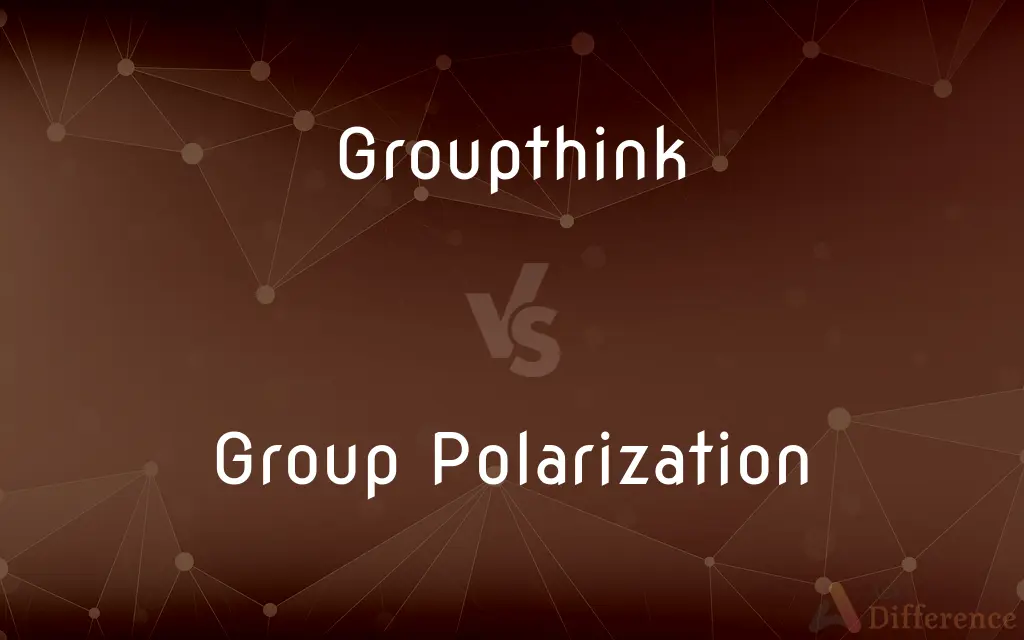Groupthink vs. Group Polarization — What's the Difference?
Edited by Tayyaba Rehman — By Fiza Rafique — Published on December 2, 2023
Groupthink is a desire for harmony or conformity in a group, often resulting in incorrect decisions; Group Polarization refers to group discussions leading to more extreme positions.

Difference Between Groupthink and Group Polarization
Table of Contents
ADVERTISEMENT
Key Differences
Groupthink and Group Polarization are both social psychological concepts that explore group dynamics. Groupthink describes the phenomenon where individuals within a group prioritize agreement over critical evaluation, leading to decisions that may not be optimal. On the other hand, Group Polarization emphasizes the intensification of group members' initial positions after discussing them.
In understanding Groupthink, it's essential to realize that the desire for harmony and uniformity within the group can suppress dissenting viewpoints. This can cause the group to overlook alternative solutions or underestimate risks. Conversely, Group Polarization might start with members having mild opinions, but after discussions, these opinions become more extreme, either more conservative or more radical.
Groupthink and Group Polarization, while unique in their mechanics, both highlight potential pitfalls in group decision-making. Groupthink can lead to subpar decisions due to the absence of critical analysis. In contrast, Group Polarization can cause groups to adopt more extreme views than what individual members initially held.
The prevention of Groupthink and Group Polarization requires awareness and interventions. Encouraging open dialogue, critical evaluation, and seeking external feedback can help combat Groupthink. Ensuring diversity of opinion and promoting a culture where dissenting voices are valued can mitigate the effects of both Groupthink and Group Polarization.
Comparison Chart
Definition
Prioritizes harmony over criticality.
Intensification of initial positions.
ADVERTISEMENT
Outcome
Suboptimal decisions.
More extreme decisions.
Root Cause
Fear of dissent or conflict.
Reinforcement from group discussions.
Prevention
Encouraging open dialogue.
Ensuring diversity of opinion.
Related to
Conformity and cohesion.
Amplification of group's beliefs.
Compare with Definitions
Groupthink
The suppression of dissenting opinions to maintain harmony.
Due to Groupthink, nobody voiced concerns about the project's direction.
Group Polarization
Group conversations intensifying shared attitudes.
The online forum saw Group Polarization, with members becoming more entrenched in their views.
Groupthink
Group members prioritize agreement over evaluation.
Groupthink resulted in the committee failing to consider alternative solutions.
Group Polarization
The tendency for group discussions to lead to more extreme positions.
After hours of debate, Group Polarization caused the committee to take a harder stance.
Groupthink
The pressure within a group to align with a perceived consensus.
The board's Groupthink made them overlook the risks of their decision.
Group Polarization
Amplification of group members' initial beliefs after discussion.
Group Polarization was evident when the mild opinions became strong convictions.
Groupthink
A phenomenon where conformity outweighs critical judgment.
The team fell into Groupthink, overlooking potential flaws in their plan.
Group Polarization
The shift of a group's median position after collective discussion.
The workshop exhibited Group Polarization, pushing participants toward more radical views.
Groupthink
Collective decision-making where cohesion trumps accurate appraisal.
Groupthink led them to unanimously support a flawed strategy.
Group Polarization
Strengthening of the predominant viewpoint in group settings.
Their retreat led to Group Polarization, with the team's initial ideas becoming more extreme.
Groupthink
The act or practice of reasoning or decision-making by a group, especially when characterized by uncritical acceptance or conformity to prevailing points of view.
Groupthink
A process of reasoning or decision-making by a group, especially one characterized by uncritical acceptance of or conformity to a perceived majority view.
Groupthink
Decision making by a group (especially in a manner that discourages creativity or individual responsibility)
Common Curiosities
Is Groupthink always negative?
While it prioritizes group harmony, it often results in decisions that are not critically evaluated.
What are the dangers of Groupthink?
It can lead to suboptimal decisions, as critical analysis and alternative viewpoints might be overlooked.
How can Groupthink be prevented?
By encouraging open dialogue, valuing dissenting opinions, and seeking external feedback.
What is Groupthink?
Groupthink is a psychological phenomenon where the desire for group cohesion leads to poor decision-making.
How does Group Polarization manifest?
It starts with members having mild opinions, but after discussions, these opinions become more extreme.
What causes Groupthink?
Factors like the pressure to conform, group isolation, and lack of diverse viewpoints can lead to Groupthink.
What is Group Polarization?
It's when group discussions lead to members taking more extreme positions than their initial ones.
Can Group Polarization be beneficial?
It can be if the shift is towards a more informed or justified stance, but it can also amplify biases.
Are there any positive aspects of Groupthink and Group Polarization?
While they can foster unity and commitment, they often hinder critical analysis and diversity of thought.
Are online forums prone to Group Polarization?
Yes, especially in echo chambers where only similar views are expressed and reinforced.
Do Groupthink and Group Polarization affect only large groups?
No, they can affect any group size, from small teams to large organizations.
What's the main difference between Groupthink and Group Polarization?
Groupthink is about prioritizing harmony over critical evaluation, while Group Polarization is about the intensification of initial positions.
Can a group experience both Groupthink and Group Polarization simultaneously?
Yes, a group can both converge on a shared opinion (Groupthink) and then intensify that opinion (Group Polarization).
How can leaders mitigate the effects of Groupthink and Group Polarization?
By promoting diversity of thought, encouraging open feedback, and being aware of these phenomena.
Which is more dangerous: Groupthink or Group Polarization?
Both can be harmful in different contexts, and their danger depends on the situation and the decision at hand.
Share Your Discovery

Previous Comparison
Samoan vs. Polynesian
Next Comparison
Starch Cellulose vs. GlycogenAuthor Spotlight
Written by
Fiza RafiqueFiza Rafique is a skilled content writer at AskDifference.com, where she meticulously refines and enhances written pieces. Drawing from her vast editorial expertise, Fiza ensures clarity, accuracy, and precision in every article. Passionate about language, she continually seeks to elevate the quality of content for readers worldwide.
Edited by
Tayyaba RehmanTayyaba Rehman is a distinguished writer, currently serving as a primary contributor to askdifference.com. As a researcher in semantics and etymology, Tayyaba's passion for the complexity of languages and their distinctions has found a perfect home on the platform. Tayyaba delves into the intricacies of language, distinguishing between commonly confused words and phrases, thereby providing clarity for readers worldwide.










































